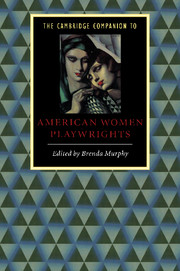Book contents
6 - Feminism and the marketplace
the career of Rachel Crothers
from Part 2 - Inheritors
Published online by Cambridge University Press: 28 May 2006
Summary
By all objective standards, Rachel Crothers is the most significant woman playwright the United States produced in the early twentieth century, and one of the four or five major American playwrights who did their best work before World War II. An actress, director, and the author of more than thirty plays, most of which were commercially successful, Crothers was a consistent and acknowledged presence in the American theatre between 1906, when her first hit appeared, and 1937, when her last play achieved a run of 288 performances and won the Theatre Club’s award for the outstanding play of the 1937-38 season. Crothers has consistently been undervalued by drama historians and literary critics, however. Like that of most women writers in the early twentieth century who wrote about the relations between the sexes, the institutions of marriage and the family, and the struggle of women to define their values in the face of the conflicting demands of nurturing a family and pursuing a career, Crothers’ work was marginalized by her contemporary critics and reviewers. The influential academic critics of American drama continued this marginalization during the thirties by setting Crothers’ work outside the “mainstream” of male playwrights and dismissing it as a “feminine” footnote. Arthur Hobson Quinn’s chapter, “Rachel Crothers and the Feminine Criticism of Life,” in the standard prewar history of American drama, is typical of this treatment.
- Type
- Chapter
- Information
- The Cambridge Companion to American Women Playwrights , pp. 82 - 97Publisher: Cambridge University PressPrint publication year: 1999
- 3
- Cited by



